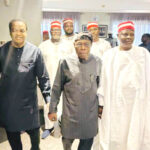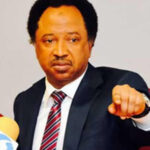The story of Deng Xiaoping is one that Nigerians and Nigerian youths interested in politics should seek to come to know and understand. Deng, who many Nigerians might not be aware of like they are of Nelson Mandela, Martin Luther King, Jr., or Margaret Thatcher is in my estimation one of the greatest figures of the twentieth century. The transformations he caused to happen in China that has made that Asian dragon one of the great economies and nations of the world began when he took power in 1978 at the ripe old age of 74 and served as China’s paramount leader till 1989.
When Deng was young, at the age of 16 he, along with other Chinese students, went to France to study. He stayed in France for five years as a poor student and worker and later would again spend a year in the Soviet Union. The sojourn to France was to learn from the west, how they came to become so developed and advanced.
As a youth in France between the ages of 16 and 21, Deng was part of the small gathering of intellectuals who regularly met to articulate the Communist youth movement strategy. He worked closely and observed Zhou Enlai, who although only six years older than him was already the leader of the Chinese Communist Party (CCP) in France and under whose tutelage Deng organised and produced pamphlets that published the communist message to Chinese students studying in France. In the Soviet Union, while studying at the Sun Yat-sen University, Deng worked with the top echelons of the Chinese Communist Party and was able to understand and comprehend political leadership in action, he would later work closely with Mao Zedong, the Chinese Communist leader and assume high responsibilities.
From within the inner workings of the Chinese Communist Party from an early age to when he assumed power in 1978, Deng was able to understand what was right and wrong with the vision of the Chinese Communist Party and how it had plunged China into deeper poverty and frequent crises despite unifying the country following decades of turbulent warlordism and civil war as well as internal divisions that had bedevilled China for a greater part of the twentieth century. The CCP ideology was one of prosperity and equality for all Chinese without capitalists or millionaires. Unfortunately, this ideology, rather created poverty. Deng, with a firsthand experience of the system, came to realise that for China to develop and become rich, a few people would have to get rich first. Hence there was a need for capitalism.
Shun sentiments, vote competent candidates, NILDS DG tells Nigerians
Ohanaeze, northern elders seek renegotiation of Nigeria’s unity
Deng was lucky that despite being purged twice from the power structure, and in one instance sent to do manual work in a tractor factory, he came back to power aware that China needed to change and could not continue with the Communist economic ideology. He articulated that it didn’t matter whether it was a black cat or white cat. That it was a good cat as long as it catches the mice. He took China from Communism to Capitalism without even a cogent plan as to how to do it. What he had going for him was his vision and belief. This was that the old path was wrong and that a new direction was required.
Deng vision energised his country. He was, however, humble enough to understand that he and China did not have all the answers. So he simply said China will cross the river by feeling the stones. The new operating principles were openness and a free and market based economy. He felt this was the only way through which China could catch-up and become developed and he pursued this path with determination and a will to succeed when he came to power not as a youth but as an old man.
It is important to point out that the lessons from his youth days were what made his subsequent achievements as an old man possible when he takes power at 74 and began the transformation of China. Deng had become politically active before he was twenty. His life at a very young age was organised around politics. He learnt the art of leadership from his superiors, even how to lie low, and how to access power and influence. He also learnt about the misuses of power, and how authority can be used for the greater good of society. Thus, when he came to power he was prepared. When he began China’s transformation, the country was one of the poorest regions of the world. Today, it is a self-assured, rich and prosperous nation.
The lesson from Deng’s political life, which Nigerian youth should become conversant with, is that youths today may not necessarily become leaders now, in the immediate term, however, if they want to make a vital contribution today and in the future, they must become part of the political process.
It is what youths learn today, the ideas they internalise, how they get to understand what works and what doesn’t work that will make Nigerian youths better at politics and political leadership tomorrow. The vital ideas, values and philosophies youth should be taking time to understand should be about how the world of capitalism and globalisation works and the place of Nigeria and Nigerians in it. Trying to understand that development has a formula and it is available for all nations to crack.
It was in seeking the development formula that Deng Xiaoping and his cohorts went to France, to study why the west, which historically had been behind China, had gotten ahead in modernisation and was providing meaningful livelihoods for millions of their citizens that other parts of the world could only dream of. And that such development was the fruit of good governance from the state.
Wuam is a Professor of Economic History, Kaduna State University, Kaduna

 Join Daily Trust WhatsApp Community For Quick Access To News and Happenings Around You.
Join Daily Trust WhatsApp Community For Quick Access To News and Happenings Around You.


